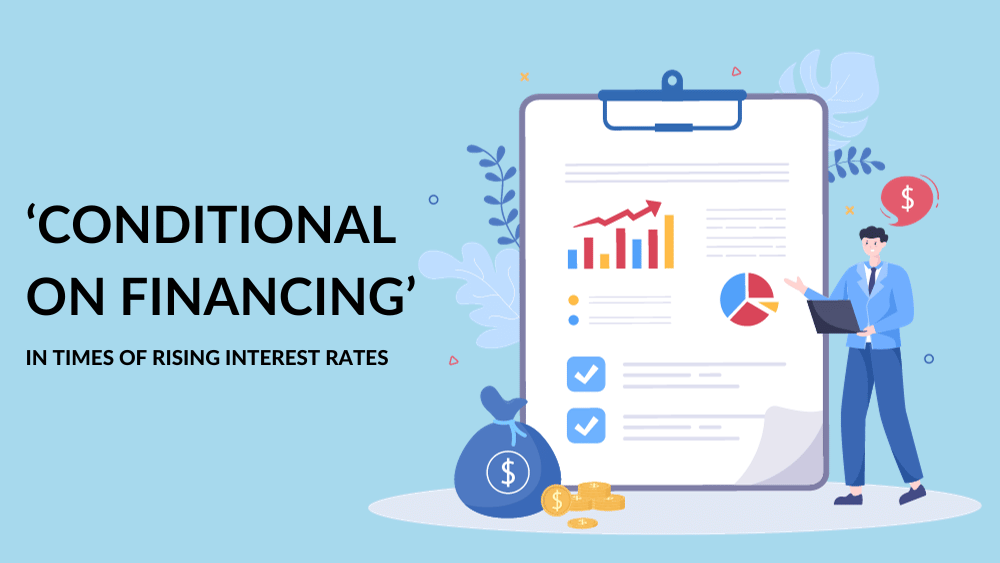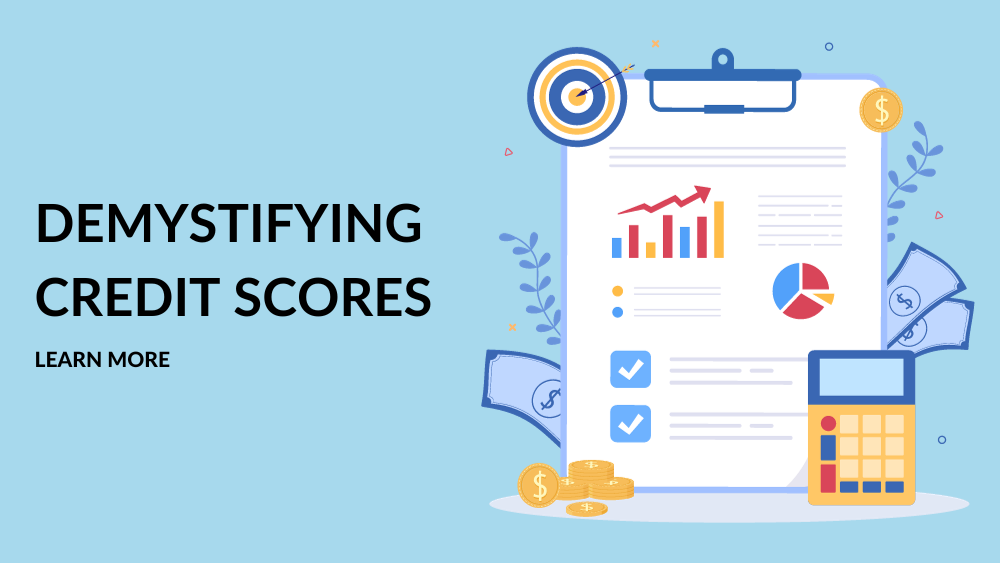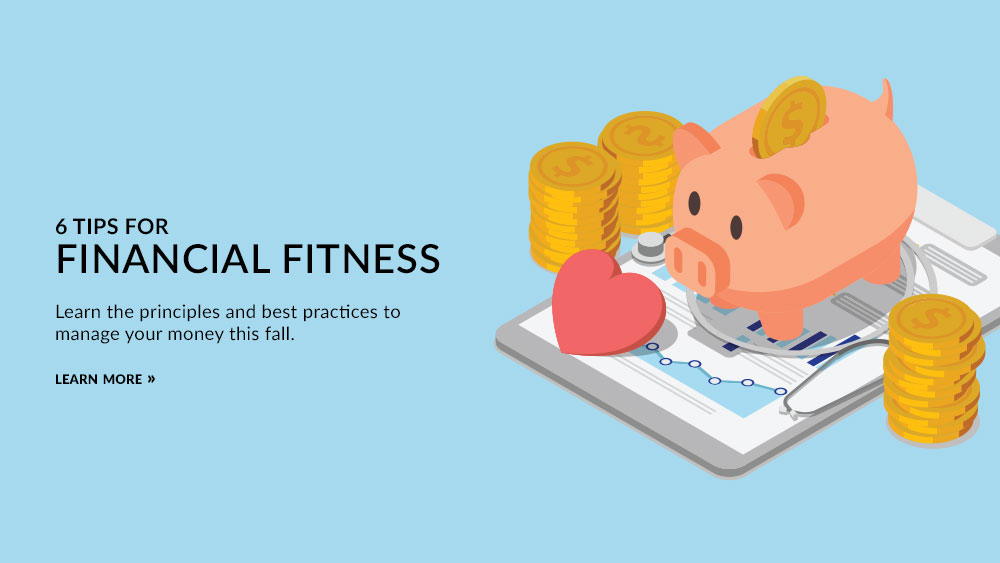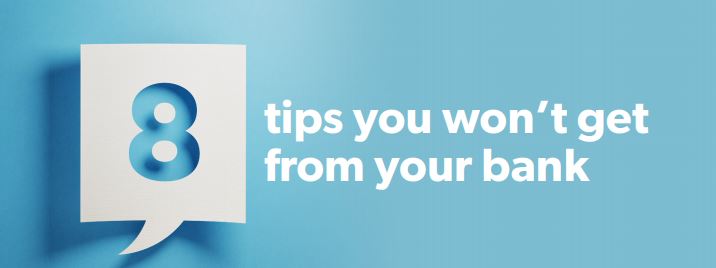Mortgage Research
The importance of 'Conditional on Financing' in times of rising interest rates

Imagine this: you've come across the perfect home, and you're thrilled to make an offer. But, here's the key question—should you include a financing condition? The simple answer, especially in today's environment of rising interest rates, is a categorical yes!
When you submit an offer to purchase with a financing condition, you're granting yourself a vital window of time, typically three to five days. This timeframe is essential to ensure that you receive full approval. Your lender, much like you, wants to feel confident about the property's value and suitability. They will perform an assessment because, ultimately, the property serves as their collateral in case of any unforeseen issues.
A mortgage preapproval does not automatically guarantee that the lender will accept the property. In today's dynamic market, there are various factors at play:
- Impact of rising interest rates: The recent surge in interest rates could alter the affordability of the property. Your lender may need to reassess your mortgage considering these changes.
- Location: The property's address may no longer align with the lender's preferred location due to changes in market dynamics.
- Historical factors: Concerns over the property's history, such as former grow-ops, environmental issues, or zoning complications, can raise red flags.
- Appraisal adjustments: Given the shifting market, the property's appraised value might not correspond with the offer you've made.
It's crucial not to let the excitement of homebuying cloud your judgment. While a mortgage preapproval serves as a useful guideline, it isn't set in stone. Lenders may reassess your eligibility, particularly if your financial circumstances or income have evolved since the preapproval. Including that 'conditional on financing' clause empowers you to revisit your lender and, if necessary, withdraw your offer.
Submitting an offer without conditions can expose you to substantial risk. If financing unexpectedly falls through, you could lose your deposit and potentially face legal action from the seller. However, if you're determined to submit an offer without a financing condition, our team can help you navigate this risky path. This involves conducting a review of all related documents, listing information, and reaching out to the lender and insurer before drafting your offer. While this approach can alleviate some risk, it's important to remember that there are no 100% guarantees.
Contact The House Team now to guide you through your home-buying journey to ensure it ends on a positive note, even in the face of rising interest rates! You can call (613) 962-1388 or request a free appointment at https://www.thehouseteam.ca/request-an-appointment.
Demystifying Credit Scores

These days, like so many things, your credit score is easily accessible and free. Not so long ago, the only way to see your credit score was to obtain a copy of your credit report, which involved submitting a request and paying for the privilege.
In 2014, however, legislation was passed that transformed the credit reporting landscape and Canadian consumers now enjoy the convenience of instant access to their credit score. While it can be an incredibly useful tool to give you a general idea of your financial standing and to protect yourself against identity theft or fraud, it’s important to understand that your free credit score (often referred to as a “consumer credit score” or “educational credit score”) isn’t what lenders use to make lending decisions.
In Canada, there are two credit bureaus – Equifax and TransUnion – that collect information from various sources (banks, lending institutions, government agencies, landlords, utility companies, telecom companies, etc.) to build your credit file. Your file contains a lot of detail about you such as employment history, payment history, outstanding debts, credit inquiries, plus any public records pertaining to finances. The credit bureaus use various complex scoring models to interpret the data and assign you a 3-digit credit score ranging from the lowest (300) to the highest (900). The higher the score, the better.
While most people think their credit score and their credit report are the same thing, they are not. Think of your credit report as your financial report card and your credit score as your overall grade. Your credit score does carry some weight with lenders, but it’s just a starting point. To determine what kind of risk you are likely to be as a borrower, they must delve a little deeper into your file to get the complete picture.
Some Of The Key Areas That Lenders Take Into Consideration Include:
-
PAYMENT HISTORY: It’s simple but extremely important. Do you consistently pay your bills on time? This is a key behaviour that lenders are looking for and one of the strongest predictors that you are likely to meet your financial obligations in future. It is generally the most heavily weighted factor in most credit scoring models.
-
CREDIT UTILIZATION: Creditors and lenders look favourably at someone who isn’t maxing out their available credit. Even if you’re not missing payments, keeping your accounts near their maximum limit can be interpreted by lenders as a sign that you’re not able to manage your spending.
-
CREDIT MIX: It’s generally preferred by lenders to have a diverse mix of credit in your file. For example, someone with a credit card, loan and mortgage might be viewed more positively than someone with three credit cards.
-
RECENT CREDIT INQUIRIES: If lenders see that you’ve opened or applied for multiple credit accounts recently, they might be concerned as this may suggest an increased borrowing risk. One of the advantages of working with a mortgage broker is that we can submit your mortgage application to multiple lenders with only one credit inquiry.
- CREDIT HISTORY: Lenders look at your credit history to understand your financial behaviour over time. A well-documented history of responsible credit behaviour is usually a very good indication that you will be able to manage debt in future.
-
PUBLIC RECORDS AND COLLECTIONS: Bankruptcies, liens, judgments, and accounts in collections are red flags for lenders as they indicate potential financial difficulties.
So, What Does This Mean?
So while that free credit score you got likely included some basic information such as current balances, recent credit inquiries, any missed payments, etc., it's nowhere near the amount of detail that lenders see when they pull your credit bureau.
As your mortgage broker, our team possesses extensive knowledge and experience in the mortgage industry. We can review your credit together in a stress-free environment to provide a comprehensive understanding of your creditworthiness from a mortgage lender's perspective, help you gain valuable insights into how lenders perceive your financial profile and help you understand your mortgage eligibility.
The House Team can also provide guidance on improving your creditworthiness, if necessary. If your mortgage renewal date is approaching, if you're contemplating a move or if you'd just like a mortgage review, please feel free to get in touch with us! You can call (613) 962-1388 or request a free appointment at https://www.thehouseteam.ca/request-an-appointment.
Smart Move: Bridge Financing Provides A Smooth Transition Between Mortgages

Bridge financing provides a smooth transition between mortgages
Summer is officially in full swing which means vacation time, backyard barbecues, pool parties, etc., but summer is also “moving season”. If you’re one of the many Canadians who will be moving this summer, we want to talk about a topic that could be very useful for you: bridge financing.
As the name implies, bridge financing is a type of short-term loan that can help you cover the gap between buying a new home and selling your current one. It can provide you with the funds you need to make a down payment on your new home, pay for closing costs, or cover any other expenses related to your move.
Bridge financing offers certain advantages that can make your move easier and more affordable.
Here are a few:
Flexibility – You have more control over the timing of your move. You don't have to worry about selling your home before you can buy a new one or finding a temporary place to stay while you wait for your closing date. You can move into your new home as soon as it's available and pay off your bridge loan when you sell your old one.
Confidence – You can avoid some costly mistakes that might arise when buying and selling in a competitive market. For example, you don't have to accept a low offer on your home just because you need the money quickly or settle for a less-than-ideal home just because it's available. You can take some time to find the best deal for both transactions and negotiate with confidence.
Savings – You can save money in the long run. Depending on your situation, you might be able to avoid paying for two mortgages at the same time or paying rent while you wait for your new home. You might also be able to avoid paying for mortgage insurance or higher interest rates if you have a larger down payment thanks to your bridge loan.
Of course, bridge financing is not for everyone. It has some drawbacks and challenges that you should be aware of before you apply for it. For example, bridge financing can be more expensive than other types of loans, as it usually comes with higher interest rates and fees. It can also be harder to qualify for, as lenders will look at your income, credit history, and equity in both homes. And it can add more stress and uncertainty to your move, as you will have two loans to repay and two properties to manage.
So, before you decide if bridge financing is or isn't right for you, let's have a conversation. Working with a trusted mortgage professional means you have access to many options. We can assess your financial situation and find the best lender and loan for your needs. If it's determined that bridge financing is a smart move for you, a trusted mortgage professional will guide you through the process, answer any questions you have, and help you avoid any potential pitfalls along the way.
If you are interested in learning more about bridge financing, or if you have any other questions pertaining to your mortgage, reach out to The House Team! Whether you're making a move in the near future, renewing your mortgage, if you're feeling stifled by your debt load, or if you have a large expense coming up and want to explore some financing solutions, let's talk about ways to help you achieve your goals.
Schedule a free, no-obligation review of your situation at https://www.thehouseteam.ca/request-an-appointment
Learn About The New First Home Savings Account (FHSA) Program

Learn more about this registered program for new homeowners in Canada
As the market begins to stabilize and we're seeing housing prices rising again in different areas, many individuals are looking at purchasing their first home before home prices rise too much. Canadians are realizing that we are unlikely to ever see interest rates like we did during COVID and that the housing market is unlikely to correct much further given Canada’s current economic forecasts, which has given buyers the nudge they need to re-enter the market.
If you or someone you know is considering this, there’s some good news. The federal government has recently introduced a new program to help first-time home buyers save for their dream home: the First Home Savings Account (FHSA).
About The FHSA
The FHSA is a registered plan that allows you to save up to $40,000 in a tax-free account for your first home purchase. The plan allows you to contribute up to $8,000 per year and deduct your contributions from your taxable income, just like an RRSP. You can also carry forward unused contribution room into the following year, just like an RRSP.
Any interest accumulated inside the plan is tax-free and when you are ready to buy your first home, you can withdraw your savings tax-free, just like a TFSA. While $40,000 may not seem like nearly enough for a downpayment in many markets, there are also additional programs that you can leverage – and every penny counts towards getting you that first home.
The FHSA can complement the existing Home Buyers' Plan (HBP), which allows you to withdraw up to $35,000 from your RRSPs to buy or build a qualifying home. You can use both programs together to boost your savings and reduce your taxes. The reduction in taxes can make saving to max out these programs easier and is an important part of the program.
Eligibility
To be eligible for the FHSA, you must meet the following conditions:
- You must be a resident of Canada and at least 18 years old.
- You must not have owned a home or lived in a home owned by your spouse or common-law partner in the past four years.
- You must have a written agreement to buy or build a qualifying home for yourself or for a related person with a disability.
- You must intend to occupy the qualifying home as your principal residence within one year of buying or building it.
If you or someone you know are a first-time home buyer, give The House Team a call! We can answer any questions you have, review your financial situation, and discuss which options are the best for you. Individuals can call us at (613) 962-1388 or request a free appointment at https://www.thehouseteam.ca/request-an-appointment.
Spring Cleaning Your Finances

Spring cleaning? Don’t forget to give your finances a polish.
As the weather gets warmer and spring blooms around us, it's the perfect time to refresh your finances and give them a good spring cleaning. As your trusted mortgage professionals, we are here to help you get started with some tips and insights on how you can get your finances in order and prepare for a brighter financial future.
Review your credit report
The best possible starting point for any review of your finances. Your credit report is a crucial component of your financial health, and it's essential that you check to make sure it’s accurate and up to date. You can obtain a free credit report from each of the major credit reporting agencies once a year, and you can also use a variety of services to get a rough update as well, so take advantage of this opportunity to review your report and ensure everything is correct.
Consolidate high-interest debt
While mortgage rates have gone up over the last year, they’re still considerably lower than other high-interest forms of debt, such as credit cards for example. Consolidating multiple high-interest debts into a single lower-interest mortgage can help you save money on interest and simplify your payments. By consolidating your debts, you can streamline your finances, reduce your overall payments, and focus on paying off your debt more quickly.
Review your subscriptions and cancel unnecessary ones
Many of us subscribe to various services, such as streaming platforms, subscription boxes, or gym memberships, and over time, we stop using them or no longer need them. Review your subscriptions and cancel any that you no longer use to free up some extra cash each month.
Create a budget and manage your expenses
With higher interest rates affecting those with variable mortgages, creating a new and updated family budget is crucial to your finances in 2023. If you have a mortgage renewal coming up, it’s a great time for us to touch base so you get an idea of what your new mortgage payments will be. Adjusting to these new costs and developing a new budget will help you identify ways that you can reduce your expenses, and more importantly can reduce the chance of going into debt, and then adding interest and repayment to your monthly costs.
Build an emergency fund
After doing the above steps, if you’re able to increase your cash flow, and reduce your expenses, building an emergency fund is crucial to helping cope with unexpected expenses and financial hardships. This can include job changes, medical emergencies, or even an unaccounted bill. Work towards building up a reserve of 6 months salary before starting to spend freely on things like expensive vacations or major non-essential purchases.
Spring Into A New Mortgage
Looking to renew or refinance your mortgage this spring? Get in touch with your knowledgeable mortgage broker from The House Team today. Call our team now at (866) 559-5016!
Four Ways to Take Control and Thrive in a Challenging Market

If you’re struggling financially as a result of increased living expenses and interest rates, you are not alone.
A lot of Canadians are feeling a little helpless these days, with talk of rising interest rates and inflation dominating news headlines. The good news is that there are still ways to save money and increase your monthly cash flow even in an atmosphere with higher interest rates than we’ve been used to over the last few years. Here are a few proactive things you can do to take control of your financial situation:
Anytime is a good time for a mortgage review
An analysis of your current mortgage terms may reveal opportunities to improve your situation. For example, you might be able to refinance your mortgage and consolidate any other high-interest debt to cut your overall monthly payments or you may want to consider increasing your amortization or possibly changing your payment frequency to lower your mortgage payment.
Don’t sleepwalk through your mortgage renewal
If your mortgage is renewing this year, you may be receiving (or have already received) an automatic renewal notice from your lender. Don’t accept their renewal offer without talking to a mortgage professional first! In most cases, we can shop around and negotiate a better rate than what you’re being offered.
Plug the Money Leaks
Take a very hard look at your spending and challenge yourself to find ways to save. Every little bit helps – cancel one (or more) streaming services, cut any impulse spending, dine out less, consider carpooling, take advantage of price matching at your local grocery store …the list goes on and on.
PRO TIP: Print off your credit card statements, highlight the items you didn't realize were still active or you aren't using anymore, and cancel these services.
Supplement your income
Tap into your talent or skills and consider turning that into a money-making side gig. Or if it’s feasible, consider building a rental unit in your home and let renters help you pay your mortgage. Any extra income can be put toward paying off debt, paying down your mortgage or just providing the much-needed breathing room every month.
Even in a higher-interest rate situation like the one we're in right now, there are still options available to reduce monthly spending and increase cash flow. You may make a more financially secure future for yourself and your family by examining the conditions of your mortgage, making cost reductions, and increasing your income. And although some of these choices may not be the most comfortable in the short term, the long-term payoff is well worth it.
Whether it’s managing your current situation, or looking to your future situation in regard to your home, building a plan is the best way to help you take charge of your financial destiny.
Let's Start Building Your Plan
Are you ready to reach your financial goals, including owning your own home? Let's talk! The House Team can help you maximize your financial fitness, build wealth, and reach your goals.
Get in touch with your knowledgeable mortgage broker from The House Team today and learn how you can start working out your finances and attaining your financial goals. Call us today at (866) 559-5016!
Can I Help My Child Buy Their First Home? Sharing a Mortgage in 2021
Can I Help My Child Buy Their First Home? Sharing a Mortgage in 2021
First time homebuyers are experiencing one of the most legendary housing markets in existence right now.
If you’re in the market to sell your home, this could very well be the best time to do so! However, if you’re trying to buy a home, the narrative changes instantly.
The price of homeownership is no longer comparable to even a decade ago! Not only are houses going over asking, leaving anxious first time homebuyers with stacks of declined offers, but the initial asking price in itself is quite intimidating.
You can imagine how difficult this must be for our younger generation. With the financial demands of school loans and a sheer lack of savings, it’s no wonder there’s a considerable struggle for first time homebuyers. Add the peaking housing market and skyrocketing asking prices to the list and the opportunity for homeownership becomes almost nonexistent for these young people.
Is there a way for parents to help their child purchase their first home, without going into debt themselves?
What’s involved in giving your child a boost towards homeownership?
As parents, we want to see our children succeed. To reach their goals and even to reach the goals that we had at their age. And it’s only natural for us to want to support their ambitions in the best way we can.
In order to help our children make that first step into the real estate market, there are two strategies to choose from:
- Gifted Down Payment – You sign a letter for the lender stating the funds are a gift and are not required to be paid back at any time.
- Co-signing the Mortgage – You assume a shared legal responsibility, agreeing to repay the mortgage if your child is unable to do so.
But before making the decision to give or co-sign, it’s important to consider what this financial commitment might mean for your own financial wellbeing, your family dynamic, your child’s level of commitment and the long-term effects of the agreement.
4 Tips To Sharing a Mortgage With Your Child
Supporting your child’s homeownership dreams and giving them a leg up in the current housing market is a beautiful and compassionate objective, but is it a realistic one?
1. Don’t Forget About Your Own Financial Responsibilities and Constraints.
The first consideration you should have when debating whether to support your child financially is to ensure that your own finances aren’t going to take a hit. After all, your first responsibility is to your own financial security.
Consider what kind of help you can realistically afford without creating financial stress or tension in your own life.
For example, if you loan the money and it is never repaid, will it affect your own financial security?
Can you afford to give the money, and if so, how much?
Ensuring that you are stable in your own finances is not only necessary right now, but down the road it could potentially save your child the money it would take to support you in the future (ie. nursing home care, medical bills etc.)
2. Consider Family Dynamics.
Family dynamics are incredibly important to consider as well, if you are considering aiding in financial support. Why? Because this large gift (whether being repaid or not) could create tension, jealousy or even rivalry between other family members who did not get that same support.
Consider these questions:
- Are there other siblings or other family members to consider?
- Will there be an issue of fairness that you need to manage?
3. Ensure That Your Child Understand The Extent Of This Financial Responsibility.
Homeownership involves more than just a monthly mortgage payment. There’s heat, hydro, insurance, cable, internet, taxes, and of course the repairs and upkeep.
Owning a house is an incredible achievement, but it is also a large responsibility.
Before you offer your child financial support, consider whether they’re ready for the financial responsibility of owning a house. You might be able to help them pay the initial down payment or mortgage, but can they support the rest?
4. Consider Property Law If Your Child is Sharing The Home With a Partner.
Does your child share, or plan on sharing, their home with a partner? If so, there are some protections that need to be put in place.
For example, should your child’s relationship end, you may discover that 50% of the money you put into the house investment goes completely to your child’s partner as part of a settlement agreement.
If this is a concern for you, be sure to get in touch with a real estate lawyer in order to discuss what protections you may be able to put in place before funding.
Get In Touch With our Mortgage Experts In Quinte and Peterborough
Your child is preparing to embark on an important financial journey and you want to do your best to help get them on the right path.
The best place to begin? With sound, expert advice!
Does your child want to begin their first time homebuyers adventure someday? Help them now by teaching them to make healthy financial habits early on. Have them get in touch with The House Team for access to the best mortgage rates and clear-eyed, common-sense advice - the earlier the better!
Our team is here to connect you with the right lenders for your first time homebuyers mortgage needs.
Contact our mortgage experts at 866-559-5016 or book your Mortgage Appointment HERE.
6 Financial Fitness Tips To Get You Back On Track In Fall 2021

6 Financial Fitness Tips To Get You Back On Track In Fall 2021
Somehow, our long-awaited summer has turned into fall - Happy September!
And with the end of summer comes our back-to-regular-life routines. Although these systematic activities might look slightly different this year, it is such a relief that some of our pre-pandemic normalities are coming back!
As we head back to in-person events, offices and brick and mortar schooling, there is a definite and noticeable optimism that we may be moving towards the end of this pandemic era.
Are you a goal setter, an organizational enthusiast or simply looking to focus this school year on healthy intentions that benefit your life and budget? Fall time has always been a great time to get back into the swing of things - including your financial fitness! And 2021 might just be the most important year ever to put these healthy financial activities in motion.
Keep reading for practical finance tips from our finance experts at The House Team. We can help make sure that your finances are fit this fall - and that they stay that way! Providing you with the flexibility and intentionality you need to reach your goals.
1. Splurge...Just a Little!
You might be thinking, “why is spending money included in this list?”. Well, over the last year, many of us dealt with difficult, and unexpected, challenges and stressors. Ones that we didn’t even know could exist - including not having the freedom to see our loved ones.
Now that we are beginning to emerge from that very difficult season, we all want to live a little! To experience some of that spontaneous adventure and enjoy our lives more fully.
Essentially, we all want to live a little - and that’s okay! In fact, it’s expected. However, we encourage you to do this strategically, in order to not break the bank.
Example: Maybe have some celebratory days with a set amount that you can spend where you go out and do the things you’ve really missed (ie. going to the movie theatre!).
2. Revisit (Or Establish) Your Realistic Budget!
Having a budget is one of the most important ways to achieve a solid financial future - that goes without saying! It might not be the most thrilling task, but it’s one that will give you a clearer picture of where you stand and how much you can (or should) truly spend. You’ll also be able to determine how much money you can allocate to your “live a little” fund!
When you begin preparing your budget, it’s important to first take a new look at your monthly bills. Go through them line by line. You may have signed up for services you very rarely use or, perhaps, don’t even remember requesting.
What To Look For In Your Monthly Bills:
- Small, unexplained charges.
- Fees.
- Add-ons.
- Services that you can now live without.
3. Maintain a Good Credit Score.
Your credit score is essentially your passport to financial opportunities! It can mean the difference between getting approved or denied for any kind of credit and can prevent you from getting the lowest mortgage rate.
The good news, however, is that you have a lot of control over your credit score! That’s why it’s important to always have “good credit behaviours”.
3 Ways To Maintain a Good Credit Score:
- Paying your bills on time.
The biggest contributing factor to having a good credit score is a timely bill payment history. Meaning, never letting a bill go past the set due date.
- Never requesting more credit unnecessarily.
A limit increase request can hurt your credit score, especially if you don’t have a long credit history.
- Keeping your credit card balance low.
Know your credit limits and try not to use more than 30% of the available amount!
We also recommend not applying for store cards in order to save on your purchase that day. And, before you decide to cancel a credit card, always ask for expert financial advice.
4. Focus On Your High-Interest Debt.
If you find that your debt is increasing your stress, debilitating your opportunities and preventing you from reaching your goals, it’s time to make a change!
If you have enough home equity, you may be able to move that debt to your lower-rate mortgage.
Benefits Of Transferring Your Debt To Your Lower Rate Mortgage:
- You could save thousands of dollars in interest.
- You could have one lower monthly payment that greatly improves your cash flow.
- You can experience reduced financial stress.
PRO TIP: Always keep an eye on your high interest debt and pay down your credit cards as much as possible in order to avoid further debt ensnarement in the future.
5. Spend Time, Not Money.
We can all agree that, over the past year, individuals have gained a new appreciation of being able to spend time with loved ones in person. The value of this time has drastically increased!
Focusing on spending time, instead of money, may keep you from spending what you might not have or might not want to spend.
6. Help Others.
Although this pandemic allowed the world to pause, reflect and re-evaluate - all healthy things - it also caused mass panic, fear, stress and unexpected financial loss.
There are many that weren’t very fortunate during the pandemic. Consider committing some money to help give back, support and encourage – ie. donate to charities, support local shops, tip restaurant workers etc.
The House Team Can Help You Maximize Your Financial Fitness This Fall
Are you ready to start this year off strong? It’s time to get back in control of your finances! The House Team can help you maximize your financial fitness, build wealth and reach your goals.
Get in touch with your knowledgeable mortgage broker from The House Team today and learn how you can start working out your finances and attaining your financial goals. Call us today at (866) 559-5016!
Fixed Rate Or Variable Rate Mortgage - Which Is The Better Choice?

In Canada, there are two main types of mortgage rates - a fixed rate and a variable rate - and both have their own pros and cons. Understanding the difference between these two types of mortgage rates can be daunting - especially when you aren’t very familiar with the terms - however it is extremely important for homebuyers and homeowners to understand their mortgage rate options BEFORE making a financial commitment.
How do you know which mortgage rate is best for you, your budget and your goals?
The House Team in Belleville, Ontario, is focused on making the mortgage process as simple and straightforward as possible. This season, we’re seeing aggressive pricing for variable rate mortgages, while fixed mortgage rates continue to be at historically low levels. We frequently conduct research on which type of mortgage is best for today’s uncertain environment in order to properly advise and direct each of our clients.
Which is best for today’s uncertain environment? Let’s find out!
What is a Fixed Rate Mortgage?
If you choose a fixed-rate mortgage, you will know with absolute certainty what your interest rate and mortgage payment will be each month for the entire term of your mortgage. This often offers stability and peace of mind - especially for first time home buyers, those on a tight budget or those who haven’t owned a home in quite some time.
Since a fixed rate mortgage is not affected by fluctuating interest rates, you can essentially "set it and forget it".
What is a Variable Rate Mortgage?
If you choose a variable rate mortgage, your interest rate will fluctuate with your lender’s Prime Rate, which in turn tracks the Bank of Canada’s overnight rate - expressed as “prime minus x percent.”
If the Bank of Canada increases or decreases its rate, you will likely see this change reflected in your monthly mortgage payment. Since it can be difficult to predict what kind of increases and decreases are ahead of us, a variable-rate mortgage is best suited to people who have a flexible budget and can tolerate a higher risk.
 What Is Prime Rate?
What Is Prime Rate?
Haven’t heard this term before? Don’t worry!
Prime rate refers to the ‘reference rate’ that banks use as the lowest commercial interest rate charged at that time. Yesterday the prime rate was 2.45%.
It’s important to note here that the prime rate is actually used to calculate the variable rate mortgage, as it acts as the base percentage amount.
The prime rate is reviewed 4 times per year and has not changed in 2 years...however the possibility of it fluctuating still exists.
Which is Better in 2021 - Fixed Rate or Variable Rate?
It’s important to consider the many “what if” scenarios that could happen over the term of your mortgage. Right now, and in today’s intense housing market, variable rate offers are very compelling - causing the housing demand to be at some of the highest levels ever seen.
Benefits of Fixed Rate Mortgages:
- “Set it and forget it”
- Releases budget stress
- Provides financial stability
Benefits of Variable Rate Mortgages:
- Historically speaking, variable rates are usually less expensive over the term (approximately 5 years).
- Variable rate is usually lower than the fixed rate.
But it’s not just about the rate…
If you decide to break off your mortgage prior to the end of your term, you will be charged. This charge is called a prepayment penalty. If you are in a fixed rate mortgage, this penalty is the greater of three months interest OR interest rate differential (IRD), the greater of the two. If you are in a variable rate mortgage, the penalty is only three months interest.
If your circumstances change (whether you are accessing equity or refinancing at a lower interest rate) and you need to get out of your mortgage, you will appreciate the much lower penalty to get out of a variable rate vs. a fixed rate mortgage.
Note: Approximately 2/3 people with fixed mortgages do actually end up breaking their mortgage prior to the end of the term.
Most variable rate mortgages will allow you to exercise an option to “lock in” a fixed rate with zero penalties when the time is right to switch over to a fixed-rate mortgage. At this point, you can also set up your mortgage payments at what they would be if you took the higher fixed rate, which helps you pay down your mortgage faster and creates a financial buffer for you if interest rates rise later.
With inflation concerns on the horizon, the Bank of Canada may raise the overnight rate sooner than expected, which will affect those in variable mortgages. While most economists agree that no one can predict what will happen with inflation as the economy continues to reopen, it is a continual unknown.
Refinancing Your Mortgage With a Fixed or Variable Mortgage Rate
As mentioned above, it is possible to refinance with a fixed or variable rate mortgage, however both have their penalties.
Refinancing With Fixed Rate Mortgage: 3 Months Interest OR Interest Rate Differential (IRD), the greater of the two
Refinancing With Variable Rate Mortgage: 3 months interest
Bottom line is to always get advice; the best choice depends on your specific situation.
You Can Trust The House Team in Belleville, Ontario With Your Mortgage Needs
If you are looking to purchase, renew, or refinance your mortgage in order to get today’s low rates, or for debt consolidation, get in touch with The House Team! We will discuss your specific situation and help determine the best mortgage option for you moving forward.
Recent Mortgage Rule Changes In Ontario

Recent Mortgage Rule Changes In Ontario
Keeping up to date with the new mortgage rules in Ontario can be challenging, but thankfully our mortgage experts in The House Team share everything you need to know regarding your mortgage needs.
There had been speculation that the government would act to cool the hot housing market, however the industry saw only modest measures in the April 19th federal budget. A national annual tax on foreign-owned properties that are left vacant or under-occupied was announced, which will take effect in 2022. This will only apply to "non-residents" to discourage offshore buyers.
New Stress Test
The budget referenced the recent announcement by the Office of the Superintendent of Financial Institutions (OSFI), which is proposing a new stress test rate for uninsured mortgages of 5.25%, effective June 1st.
This is higher than the current 4.79% and, going forward, will no longer be based on bank posted rates. It will be set a minimum of once per year by OSFI.
What is the stress test?
When getting a new mortgage, lenders must ensure that you pass a stress test, which means that you can handle payments at a certain qualifying rate. This is not the same rate as your actual contract rate, it's for mortgage qualifying only.
Why June 1st Matters
Uninsured mortgages (i.e. when you have more than 20% equity) approved before June 1st are not subject to this tougher stress test, so qualifying will be slightly easier.
This applies to purchases that close after June 1st with a signed purchase and sale agreement. As a result, if you are thinking of refinancing in order to get a lower rate, for debt consolidation or a purchase with more than 20% down, it's a good idea to get in touch with our mortgage team so we can discuss your situation in depth.
What about high-ratio mortgages (i.e. less than 20% down)?
This stress test has not changed but it is certainly possible that it may also become slightly tougher at some point. If you are looking to purchase, get a pre-approval so you are house shopping within your budget and have rate protection.
It's important to purchase when you are financially ready and not be driven by market conditions.
The House Team is here to help! If you have questions about your mortgage, whether existent or upcoming, please let me know!
Contact Our Office at (866) 559-5016!
8 Tips You Won't Get From Your Bank
8 Tips You Won't Get From Your Bank
If you’ve got a mortgage – or plan to get one this year – you probably know that it’s more complicated than it used to be just a few short years ago. That said, I have many tips and strategies that can help you get the mortgage you need, tweak the one you have, or help you plan for renewal. Here are my top eight:
ONE: To get the best deal, you need options. When you go to your bank, you’re talking to one lender. Their best deal might not be THE best deal. It’s also difficult to qualify at a bank if you are self-employed, have past credit issues or finding the stress test a challenge. Credit unions, alternative and private lenders are increasingly helping people get into new homes or refinance their mortgage.
TWO: Best-rate quotes are often meaningless. Mortgage rule changes have thrown mortgage pricing up in the air. Your actual rate depends on a whole slate of factors, which is why you can only get an accurate rate quote after an in-depth assessment of your personal situation.
THREE: The devil is in the details. People tend to focus on rate, but you can save thousands by making sure you get a mortgage that has fair penalties, allows you to prepay, and ensures you will also be treated fairly at renewal. Don’t end up paying exorbitant fees, or be forced to take a high rate at renewal.
FOUR: An insured mortgage might be a smart move. If your mortgage is “uninsured” and you want to switch to a new lender for a better rate at renewal, that lender will qualify you using a “stress test”, which may affect your ability to move your mortgage, and giving your lender no incentive to offer you the best rates. It’s possible that you can switch your mortgage to a lower-rate insurable mortgage that has more flexibility.
FIVE: A 30-year amortization can give you wiggle room on cash flow. A longer amortization (20% or more in equity required) allows you to minimize your mortgage payments and free up cash flow for uses like investing, business needs, postsecondary education, maternity leave, home maintenance, or other life situations. You can keep your payments at a shorter amortization and only use this flexibility if the need arises.
SIX: Monitor your credit score. The best rates go to borrowers with the best credit scores. Lenders are also paying closer attention to any warning signals that clients may have trouble paying their mortgage. If your credit slips and your lender feels your risk has increased, you may be offered a higher rate at renewal.
SEVEN: A rental suite can be a sweet mortgage helper. A home with a rental suite could help you buy a single-family home instead of a condo, get you into that neighbourhood you love, or help you offset mortgage payments in the house you’re in so you can become mortgage free sooner or have the freedom to channel money into other areas.
EIGHT: Plug your biggest money leak. If debt is choking your cash flow and you have enough equity in your home, you may be able to move that debt to your lower-rate mortgage and save thousands. Using home equity to pay down debt is one of my specialties!
Make sure your mortgage strategy is working for you and helping you build wealth. Get in touch for a review of your situation.
Book Your Mortgage Appointment Today
Prepare Early for your Mortgage Renewal

Simply put, it’s become a lot more complicated to renew a mortgage in Canada.
Some clients are surprised to discover they don’t qualify for the best rates with their current lender, or that they can’t switch their mortgage to a new lender for a better rate. Our advice? Start preparing early. Here’s why:
New accounting rules called IFRS 9 (IFRS stands for International Financial Reporting Standard) will cause lenders to pay closer attention to any warning signals that clients may have trouble paying their mortgage. As a result, if your lender feels your risk has increased i.e. perhaps your credit score has slipped, they may then offer you a higher rate at renewal, even if you have never missed a payment. Good news – download my MOPOLO app to monitor your credit score monthly!
Do you have an “uninsured mortgage”? If you want to switch to a new lender for a better rate, that new lender will need to qualify you using the new .”stress test”, which may affect your ability to move your mortgage, and giving your lender no incentive to offer you the best rates at renewal. I can help you understand your options. One of the things we’ll look at is whether we can switch your mortgage to a lower-rate insurable mortgage: a move that could offer huge savings over the long term. Not sure if your mortgage is insured or not? I can find that out for you.
Mortgage rate trends. While fixed rates are higher today than they were a year ago, many lenders are offering exceptionally low rates on their variable rate mortgages. In addition to offering the ability to save on interest, a variable mortgage can be significantly less expensive to get out of should you need to.
It’s critical that you work with a mortgage expert who has access to more than 50 different lending options, including credit unions that aren’t subject many of the same rules. So as soon as you hear from your lender about your mortgage renewal, get in touch! Or let’s have a conversation about credit improvement tips or discuss the potential impact of changes in your personal situation like reduced household income.


